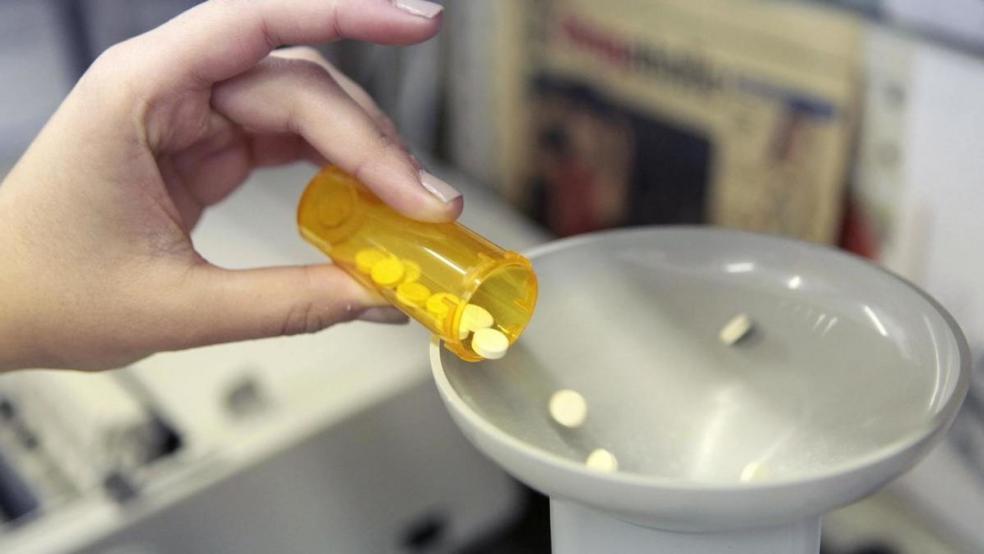President Donald Trump used his speech to a joint session of Congress Tuesday night to renew his call to contain soaring prescription drug prices. His demand comes as the pharmaceutical industry launches a public relations campaign aimed at reducing public anger and the threat of increased regulation.
Trump, who once complained that the pharmaceutical industry is “getting away with murder” by overcharging consumers and government agencies, said that his administration and Congress must “work to bring down the artificially high price of drugs and bring them down immediately.”
Related: Trump’s Lofty Vision of Renewal Comes with a Huge Price Tag
While Trump didn’t provide specifics for what needs to be done, he and a number of lawmakers, including Sen. Bernie Sanders (I-VT) and Rep. Elijah E. Cummings (D-MD), have floated some ideas. Those include speeding up the Food and Drug Administration’s approval of generic drugs to compete with costlier brand name drugs, lifting a ban on Medicare officials negotiating the price of drugs, and allowing the importation of cheaper drugs from Canada and other countries.
Prescription drug prices have climbed at a double-digit rate in recent years and are projected to continue to rise at roughly that pace. Over the past two years, the pharmaceutical industry has been rocked by high-profile cases of drug companies raising their prices by as much as 5,000 percent for some life-saving drugs that have been on the market for years.
Less than two weeks after taking office, Trump summoned the heads of many top drug manufacturers to the White House. Although Trump subsequently tempered his comments on drug industry pricing by focusing more on the need to step up price competition, he is under pressure from Sanders and other Democrats to make good on his campaign promises to halt price gouging and soaring prices.
The Pharmaceutical Research and Manufacturers of America (PhRMA) and its well-paid lobbyists have vigorously fought most of the reform proposals that have been advanced by Trump and lawmakers. They have argued, for example, that importation of cheaper drugs could jeopardize public health and that Medicare already benefits from deep discounts and rebates offered by major drug companies.
Related: Trump Jolts the Pharmaceutical Industry with Vow to ‘Bring Down Drug Prices’
While there’s no indication that drug manufacturers intend to dramatically curb their price increases, some are mounting a charm offensive to try to polish their tarnished image.
Drug companies that once treated information about their retail pricing practices and discounting like state secrets are scrambling to adopt new price transparency practices in an effort to overcome their reputation as price gougers. And many in the industry are striving to hold their average drug price increases to below 10 percent.
The latest company to step up to the plate is Johnson & Johnson, the prescription drug and medical supplies behemoth, which on Monday issued its first-ever public report on price increases for its prescription drugs. The company disclosed that the list price of its drugs rose on average by less than 10 percent a year over the past five years. What’s more, the net price that the company received after granting discounts and paying fees to middlemen increased by just five percent or less per year, according to Johnson & Johnson.
Those numbers might suggest a relatively prudent approach to marketing – and a far cry from Turing Pharmaceutical’s 5,000 percent price hike for a 62-year old drug used in treating parasitic infections, or Mylan’s 670 percent increase in price for a two-set pack of EpiPen allergy auto-injectors used to treat children suffering from violent reactions to bee stings and food allergies.
Yet Johnson & Johnson’s drug price increases were still more than twice the U.S. rate of inflation, meaning that drug prices rose at a much faster clip than prices for food, clothing and other goods and services. Also, the company’s disclosures were based on annual averages, which means that in many cases the company charged much steeper price increases for their drugs.
Related: How Big Pharma Lobbyists Keep Medicare Drug Prices High
At the same time that Johnson & Johnson went public with its price list, other major companies wary of a public and political backlash are intentionally holding their drug price increases to below 10 percent, according to a report by The Wall Street Journal.
For example, Allergan’s CEO, Brent Saunders, announced that his company would raise prices by two or three percentage points rather than the 7.4 percent average increase that the company set in January, at the start of a new marketing season.
A more dramatic illustration of this trend came after Marathon Pharmaceuticals sparked an outcry two weeks ago by establishing an $89,000 a year starting price for a muscular-dystrophy treatment that has been on the market for decades and could be purchased abroad for $1,600. After lawmakers and other complained about the pending action, Marathon announced it was postponing the price hike.
Throughout the industry, drug companies are more carefully calibrating their price increases to avoid drawing unwelcome attention and criticism, especially from Trump.
A new analysis by the investment firm Raymond James & Associates found that drug manufacturers didn’t raise list prices for as many of their drugs in January as they did the previous year, and that they initiated fewer increases of 10 percent or more. Just 5.5 percent of all the price hikes reached the 10 percent level last month, according to the report, compared with 15 percent that did so in 2016, and 20 percent two years ago.
“You have to give credit to the government-relations departments of the major drug companies,” said Joseph Antos, a health care expert with the American Enterprise Institute. “They read the newspaper. And certainly, early on at least, Trump was talking about unconscionable profits of the drug industry and using very anti-PhRMA language.”





